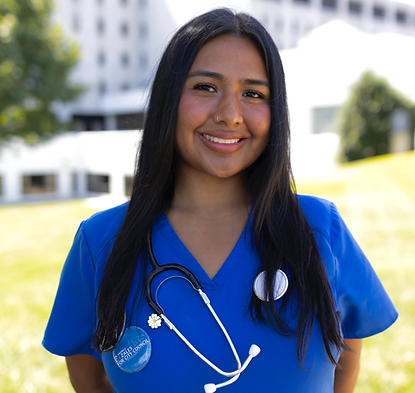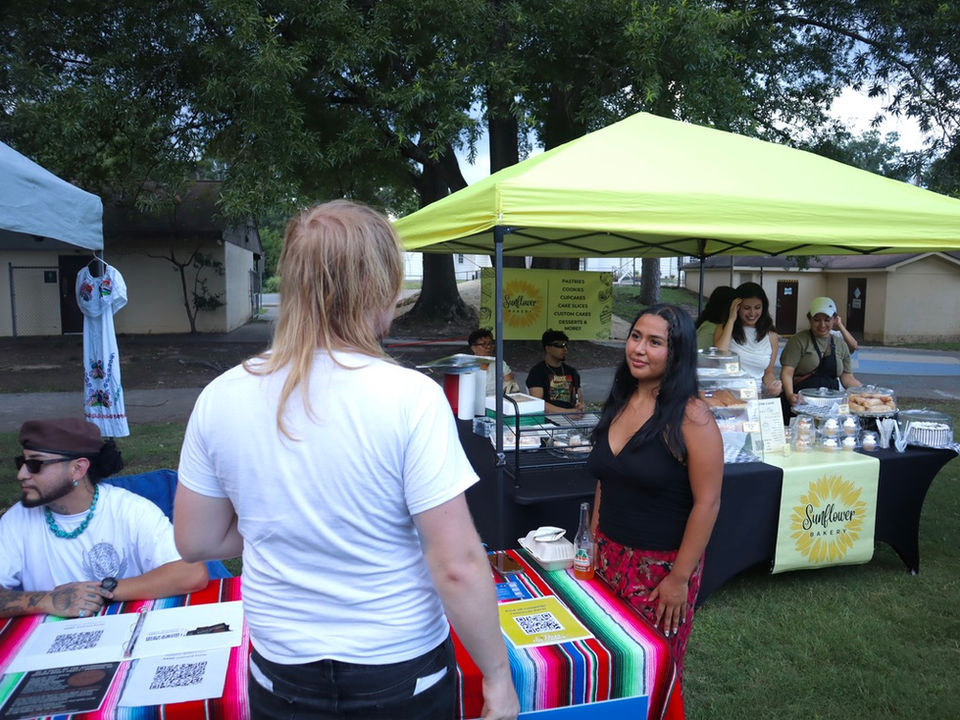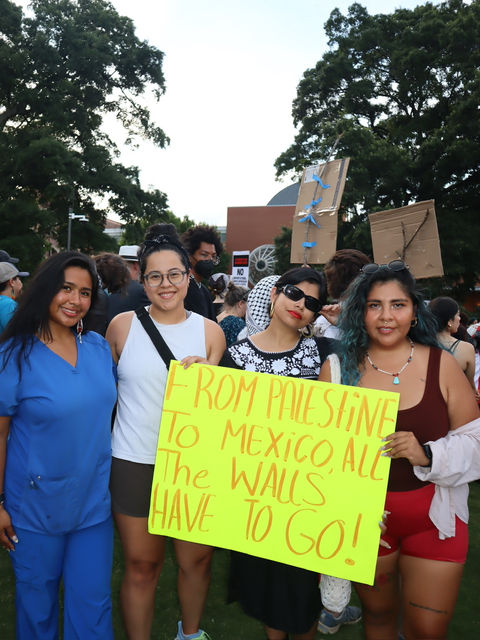Meet dr. Andrea CaZales
Hey, I’m glad you’re here.
I’m not a career politician. I’m a doctorally trained nurse, a researcher, and a lifelong community advocate. My values were shaped at home by two first-generation Mexican immigrants who taught me to work hard, care deeply, and act when something needs to change. I grew up in a home that didn’t have much, but gave everything it could. My family faced housing insecurity, lost our home during the 2008 financial crisis, and struggled to make ends meet even with two full-time incomes. And like many children of immigrants, I translated documents, advocated in schools and hospitals, and spoke up when my parents couldn’t. I’ve been stepping into that role since I was a child, and I never stopped.

My story didn’t start in Durham, but this city became my chosen home and family. I began my nursing career here just before the COVID-19 pandemic and witnessed how deeply systemic inequities impact people’s health, stability, and economic well-being. I saw families doing everything right but still struggling because the root causes were beyond the hospital: housing, safety, and how our city chooses to invest its resources.
That realization, along with the stories of the families I cared for, led me to one of the country’s only RN to PhD programs. I knew I couldn’t just treat symptoms. I needed to change the material conditions people live in, the environments that shape health, economic stability, and livelihood. I made a commitment to be proactive, not reactionary.
Over the past several years, I’ve supported families in hospitals and clinics, advanced research on Black and Latina women’s health, and listened to the mental and physical health needs of adolescents. Even our youth know: health is wealth. Through it all, I’ve mentored young people because I want more of them to see themselves in leadership.
Nursing has been the most trusted profession in America for 23 years, for good reason. We listen, we act, and we make tough calls with limited resources, guided by both evidence and care. I became a nurse to care for people, and earned a PhD to fight for them at the policy level. Every zoning vote, transit plan, and budget decision is a health decision. Durham calls itself the City of Medicine. It’s time for leadership that reflects it, understands it, and acts on it so we can become a true City of Healing. Because a healthy Durham is a thriving Durham.
That’s why I’m running for Durham City Council. To listen, to act, and to lead with community. This campaign isn’t just about me. It’s about us.
A Healthy Durham is a Thriving Durham, For All of Us
health justice is the foundation of social justice. That means fighting for economic justice, racial justice, immigrant justice, housing justice, and environmental justice, because they’re all connected.
As a PhD-prepared nurse, researcher, renter, and daughter of Mexican immigrants, I know how every decision City Council makes, from housing and transit to safety and land use, shapes the environments we live in, the opportunities we can access, and the livelihoods we depend on. From the newborns and families I cared for, to youth who are 100% of our future, to working-class families like mine, to immigrants who strengthen our neighborhoods, to small businesses that keep our culture alive, and to the seniors who built this city, Durham belongs to all of us.
Together, we can build something different. I bring the expertise, the lived experience, and the compassionate courage to meet this moment. My vision is bold, inclusive, and rooted in care, a Durham where health is the foundation and justice is the outcome. Because City Council is not just about who holds office, it is about whether everyday people see themselves in the decisions that shape our lives.
This is what that looks like:
Community: Power to the People
Too many Durham residents have never seen themselves reflected in city politics. Community means building real people power, energizing neighbors to mobilize, act, and shape the decisions that impact their lives. It means meeting people where they are, not just expecting them to come to City Hall, and making civic life accessible to working families, youth, and elders alike. Durham will only thrive when all of us have the power to shape it.
Here’s what I’ll fight for:
-
Neighborhood advisory councils rooted in communities, centering solutions shaped by those most impacted.
-
Regular, accessible drop-in hours so residents can connect with their council member outside of formal meetings and without having to go to City Hall.
-
Civic engagement that is accessible through childcare, language access, disability access, and schedules that work for working people.
-
Budgets that prioritize housing, food access, transit, and community care so that basic human rights are met and everyone can fully show up in community.
Courage: Meeting the Moment
Courage means breaking with politics as usual and standing with the people. Too often, City Council has approved rezonings and developments that displace families and invested hundreds of thousands in reactionary tools like ShotSpotter, while saying there is not enough to fund housing, youth programs, sidewalks, or mental health. Real courage is holding developers and institutions accountable, building without displacement, saying no to surveillance technology, and yes to investments that support residents across their whole lives, from youth to seniors.
In these unprecedented times, we do not need predictability. We need City Council members who are present, full of energy, and willing to go against the current if that is what humanity requires. That is the kind of courage I will bring to City Council.
Here’s what I’ll fight for:
-
Putting people before profit by prioritizing health, housing, and dignity over developer and corporate interests.
-
Holding developers, institutions, and corporations accountable to pay their fair share through PILOTs or contributions to ensure we can fund essential services without cuts, avoid unnecessary property tax increases, and prevent working families from carrying the burden.
-
Saying no to surveillance tools like ShotSpotter and yes to expanding the HEART program to provide 24/7 care-based responses.
-
Leading with compassion and evidence, proving that care is the most courageous way to govern.
Care:
Health in All Policies
Every decision Durham makes, from zoning and transit to policing and housing, is a health decision. As a nurse, I know health is not only in hospitals but also in housing, safety, and opportunity. Durham deserves leadership that sees health as the foundation of justice. But right now, the city has no consistent way to measure how policies impact people’s health and livelihoods. That is how we end up with developments that displace families, budgets that cut services, and policies that widen health disparities.
Our government cannot afford to treat health as an afterthought. Health is a human right, and Durham’s policies should prove it, not only as a City of Medicine, but as a true City of Healing.
Here’s what I’ll fight for:
-
A Health Equity Impact Assessment, a health check for every major city policy, so we stop passing harm down to the communities already most impacted. Other cities like San Francisco and Minneapolis have shown this can work.
-
Declaring gun violence a public health crisis and investing in prevention, youth mental health, a Youth Mental Health Advisory Council, and peer-led, culturally responsive care instead of reactionary technology.
-
Protecting immigrant families from ICE, even if it means putting my body on the line, so immigrant families can live in Durham without fear.
-
Building with neighbors, not over them, with development that strengthens community instead of displacing it.
Connection: Safe Homes and Shared Spaces
Too many Durham residents feel disconnected from safe housing, from local government, and from each other. Rents are skyrocketing while protections lag behind, developers profit while families are displaced, and our public spaces fail to reflect the care our city deserves. Connection means safe, stable housing and development that strengthens communities rather than displacing them. It means fast, frequent, and fare-free transit that gets people where they need to go. And it means investing in walkable, beautiful, and accessible public spaces where youth can thrive, elders can age with dignity, and every neighborhood stays rooted, green, and whole.
Here’s what I’ll fight for:
-
A Tenant Bill of Rights and stronger legal support so no one is forced from their home without protection.
-
Expanded and funded eviction diversion programs and stronger safeguards against displacement to keep families housed.
-
Fare-free public transit beyond 2025, with continued investment in safe sidewalks, bike lanes, and intersections in underserved communities.
-
A City Artist Corps to place Durham’s beauty in the hands of its own people.
-
Stronger environmental protections that preserve tree canopy, build flood-resilient infrastructure, ensure clean water, and make parks safe for everyone.


















